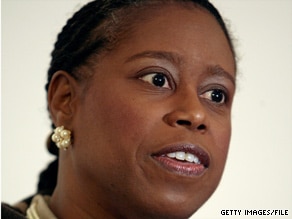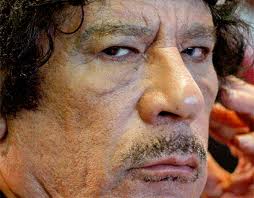A Continuation of the US/Israeli/Zionist Economic War Against The Rest of The World
By Cynthia McKinney

I must commend the authors who are prolifically researching and writing facts and truths that have been purposely hidden from us, even while in plain view. Another often-overlooked important aspect of logistics that facilitates the neocon (and neolib) agenda is finance. And so, I wanted to write a piece on finance and the crisis in Libya. To remind readers of the multi-faceted strands of U.S. policy formulation that in many instances can be traced to powerful individuals and this notion of O.I.L., instead of just oil.
Picking up on this theme, many articles landed in my inbox before I got to write the perfect piece, so I want to share them with you because I believe they are very important and cover necessary ground if we are to truly understand what we see.
Ellen Brown, author of the must-read “Web of Debt,” wrote a masterful piece entitled, “All About Oil, or All About Banking?” Here, Ellen breaks down the importance of Libya’s oil revenues and sovereign fund and the important tidbit of information that forms the core of her thesis: Colonel Qaddafi’s monetary policies constitute an important factor in him being attacked and the subsequent establishment by the NATO allies of an alternative Libyan central bank.
 After reminding the readers that under The Green Book form of governance, Libya has achieved what we in the United States do not enjoy: universal health care paid for by the state; universal education subsidized through the Ph.D. level by the state; oil revenue sharing; subsidized housing; subsidized automobile purchases; $50,000 marriage subsidy for newlyweds; and more. The more just happens to be what Libya has in common with six other countries that General Wesley Clarke announced were on a list for war that he saw from the Pentagon: neither Iraq, Syria, Lebanon, Somalia, Sudan, Iran, nor Libya belong to the Bank of International Settlements, the Central Bankers’ bank.
After reminding the readers that under The Green Book form of governance, Libya has achieved what we in the United States do not enjoy: universal health care paid for by the state; universal education subsidized through the Ph.D. level by the state; oil revenue sharing; subsidized housing; subsidized automobile purchases; $50,000 marriage subsidy for newlyweds; and more. The more just happens to be what Libya has in common with six other countries that General Wesley Clarke announced were on a list for war that he saw from the Pentagon: neither Iraq, Syria, Lebanon, Somalia, Sudan, Iran, nor Libya belong to the Bank of International Settlements, the Central Bankers’ bank.
Remember, a Project Censored award went to the young man who wrote the first story about Saddam Hussein switching from the dollar to the Euro for oil sales. That was just before certain neocons inside the United States manufactured a reason to attack Iraq. Iraq down; Sudan dismembered, Somalia dysfunctional: only Syria, Lebanon, Libya, and Iran to go.
And then, Junious Ricardo wrote another article along the same lines to drive the point home (Click for more of Junious’s writings). Then, this Russian news item: Rothchilds Fnish Off Gaddafi that explains why Qaddafi personally has become a target of the NATO action and his position on switching to a gold-backed dinar currency the introduction of a single African currency that Africans would print themselves and a rationale to explain why Libya’s 30 billion dollars was seized by President Obama.
John Perkins chimes in with this piece, “Libya: It’s Not About Oil, It’s About Currency and Loans.” And the “piece de résistance” is finally offered by “the neocon’s neocon,” Elliot Abrams. Yes, that Elliot Abrams of Iran-Contra infamy wrote, prodding President Obama to fully arm NATO allies in Libya, pushing for an all-out war, in the Weekly Standard, published on the Council for Foreign Relations website, cfr.org. Here are the Perkins piece and the Abrams pieces that make it clear–who’s war this really is. This is not a war the American people should fight and we must let President Obama know that. We must also be willing to vote for a no-war Presidential candidate.
Here are the two pieces:
1. John Perkins piece:
Libya: It’s Not About Oil, It’s About Currency and Loans
By John Perkins

April 26, 2011 “Information Clearing House” — WASHINGTON -(Dow Jones)- World Bank President Robert Zoellick Thursday said he hopes the institution will have a role rebuilding Libya as it emerges from current unrest.
Zoellick at a panel discussion noted the bank’s early role in the reconstruction of France, Japan and other nations after World War II.
“Reconstruction now means (Ivory Coast), it means southern Sudan, it means Liberia, it means Sri Lanka, I hope it will mean Libya,” Zoellick said.
On Ivory Coast, Zoellick said he hoped that within “a couple weeks” the bank would move forward with “some hundred millions of dollars of emergency support.”( By Jeffrey Sparshott, Of DOW JONES NEWSWIRES –full article here.)
We listen to U.S. spokespeople try to explain why we’re suddenly now entangled in another Middle East war. Many of us find ourselves questioning the official justifications. We are aware that the true causes of our engagement are rarely discussed in the media or by our government.
While many of the rationalizations describe resources, especially oil, as the reasons why we should be in that country, there are also an increasing number of dissenting voices. For the most part, these revolve around Libya’s financial relationship with the World Bank, International Monetary Fund (IMF), the Bank for International Settlements (BIS), and multinational corporations.
According to the IMF, Libya’s Central Bank is 100% state owned. The IMF estimates that the bank has nearly 144 tons of gold in its vaults. It is significant that in the months running up to the UN resolution that allowed the US and its allies to send troops into Libya, Muammar al-Qaddafi was openly advocating the creation of a new currency that would rival the dollar and the euro. In fact, he called upon African and Muslim nations to join an alliance that would make this new currency, the gold dinar, their primary form of money and foreign exchange. They would sell oil and other resources to the US and the rest of the world only for gold dinars.
The US, the other G-8 countries, the World Bank, IMF, BIS, and multinational corporations do not look kindly on leaders who threaten their dominance over world currency markets or who appear to be moving away from the international banking system that favors the corporatocracy. Saddam Hussein had advocated policies similar to those expressed by Qaddafi shortly before the US sent troops into Iraq.
In my talks, I often find it necessary to remind audiences of a point that seems obvious to me but is misunderstood by so many: that the World Bank is not really a world bank at all; it is, rather a U. S. bank. Ditto, its closest sibling, the IMF. In fact, if one looks at the World Bank and IMF executive boards and the votes each member of the board has, one sees that the United States controls about 16 percent of the votes in the World Bank – (Compared with Japan at about 7%, the second largest member, China at 4.5%, Germany with 4.00%, and the United Kingdom and France with about 3.8% each), nearly 17% of the IMF votes (Compared with Japan and Germany at about 6% and UK and France at nearly 5%), and the US holds veto power over all major decisions. Furthermore, the United States President appoints the World Bank President.
So, we might ask ourselves: What happens when a “rogue” country threatens to bring the banking system that benefits the corporatocracy to its knees? What happens to an “empire” when it can no longer effectively be overtly imperialistic?
One definition of “Empire” (per my book The Secret History of the American Empire) states that an empire is a nation that dominates other nations by imposing its own currency on the lands under its control. The empire maintains a large standing military that is ready to protect the currency and the entire economic system that depends on it through extreme violence, if necessary. The ancient Romans did this. So did the Spanish and the British during their days of empire-building. Now, the US or, more to the point, the corporatocracy, is doing it and is determined to punish any individual who tries to stop them. Qaddafi is but the latest example.
Understanding the war against Quaddafi as a war in defense of empire is another step in the direction of helping us ask ourselves whether we want to continue along this path of empire-building. Or do we instead want to honor the democratic principles we are taught to believe are the foundations of our country?
History teaches that empires do not endure; they collapse or are overthrown. Wars ensue and another empire fills the vacuum. The past sends a compelling message. We must change. We cannot afford to watch history repeat itself.
Let us not allow this empire to collapse and be replaced by another. Instead, let us all vow to create a new consciousness. Let the grass-roots movements in the Middle East – fostered by the young who must live with the future and are fueled through social networks – inspire us to demand that our country, our financial institutions and the corporations that depend on us to buy their goods and services commit themselves to fashioning a world that is sustainable, just, peaceful, and prosperous for all.
We stand at the threshold. It is time for you and me to step across that threshold, to move out of the dark void of brutal exploitation and greed into the light of compassion and cooperation.
John Perkins, from 1971 to 1981 he worked for the international consulting firm of Chas T. Main where he was a self-described “economic hit man.” He is the author of the new book Confessions of an Economic Hit Man. www.johnperkins.org
2. Elliott Abrams piece:
A Formula for Libya Unworthy of Our Country
Author: Elliott Abrams, Senior Fellow for Middle Eastern Studies
April 25, 2011
Weekly Standard

In April, the president decided to give non-lethal aid to the rebels seeking to overthrow the regime. No, not Libya. Not Obama. Not April 2011.
It was April 1988, the president was Ronald Reagan, and the rebels were Nicaraguan Contras. On April 1 of that year, Congress passed a bill approving $48 million in non-lethal aid and President Reagan immediately signed it into law. This was after a first appropriation of $27 million in non-lethal aid in 1985, very close to the Obama administration’s $25 million for the Libyan opposition last week.
In important ways the two cases are different, indeed even resembling a photographic negative of each other with all the key aspects reversed. The Reagan administration wanted to give lethal aid. Its efforts to arm the Contras directly and legally were stymied by Congress until 1986, when $100 million was approved and the administration could have the CIA give American weapons to the Nicaraguan rebels. But even then the administration did not say that its goal was to overthrow the government of Nicaragua. Instead, the announced objective was to use the pressure of the Contras to force the regime to the negotiating table. And despite his clear emotional commitment to the Contra cause, Reagan never used American military power directly and threatened to use it only in the event of direct Soviet or Cuban intervention.
In the Obama case, the administration has announced a far bolder goal: it has repeatedly said Muammar Qaddafi must go. The official U.S. policy, then, is to overthrow the government of Libya and the United States has employed its military directly in bombing Libya. But the administration has not asked for lethal weapons for the rebels, and its military actions in NATO have at least officially been limited to humanitarian objectives such as protecting Benghazi from being overrun by Qaddafi’s forces.
There is only one way in which the two situations are identical: In both cases, the provision of non-lethal aid represents a shirking of responsibility. In both cases, the United States identified an important goal but was (and is) unwilling—due to Congress in the Nicaraguan case and to the president in the Libyan case—to provide the means to reach that goal.
This is a foreign policy problem, to be sure, but it is worse than that: it is an immoral position for our country to take. In both cases, we cheer on rebels who are risking and losing their lives every day. We seek their victory. We urge them to fight on for the cause, despite the fact that the other side is far better armed and trained, and is a real army. Yet we refuse to give them the means to win, so that the fighting drags on and every day some rebels die who would live if they’d had the weapons we are withholding.
Consider this: We will be providing the Libyan rebels with “vehicles, fuel trucks and fuel bladders, ambulances, medical equipment, protective vests, binoculars, and non-secure radios.” Secretary Clinton said we’ll be providing some halal meals, too. This will take them to the front lines, allow them to have lunch and see the enemy, and enable them efficiently to report back on the number of dead and wounded brothers in arms—or perhaps more accurately, brothers without arms—who those ambulances are removing. It is very close to what we did for years for the Contras, sending them into Nicaragua from bases in Honduras where they got rudimentary training and equipment unlikely to terrify the Sandinistas—watches, uniforms, and boots. Same for Libya: As the New York Post described U.S. policy in Libya in an editorial last week, “Team Obama finally announced it was putting American boots on the ground — but with no American troops inside them.”
It is said that mighty Qatar is sending some arms, and there have been reports about Egypt as well, but none of this is serious. The rebels are being cheered on and defended from complete defeat, but not given the ability to win. The quip, suggesting that “The only thing that is more dangerous than being America’s enemy is to be America’s friend,” gains its black humor from episodes such as these in American national security policy. Immanuel Kant famously claimed that “he who wills the ends wills the means,” but he never spent much time in Washington.
A serious Libya policy would involve far greater American support for NATO’s actions in Libya, and it is remarkable after six decades of American grousing about European commitment to that organization to hear the British and French complain (rightly) about ours. A serious policy would recognize the Transitional National Council, through which the non-lethal aid is apparently being given. A serious policy would arm the Libyan rebels so that, if we won’t throw Qaddafi out, they can. And a serious policy would not cheer them into battle armed with “non-secure radios” and binoculars. The Obama administration clearly thinks it has achieved a nice compromise: we’re in but we’re not in, tough rhetoric but no men on the ground, help the rebels but give them no weapons. It is a formula, for stalemate and for more rebel deaths, unworthy of our country.
This article appears in full on CFR.org by permission of its original publisher. It was originally available here.
Source: Information Clearing House and Cfr.org
ATTENTION READERS
We See The World From All Sides and Want YOU To Be Fully InformedIn fact, intentional disinformation is a disgraceful scourge in media today. So to assuage any possible errant incorrect information posted herein, we strongly encourage you to seek corroboration from other non-VT sources before forming an educated opinion.
About VT - Policies & Disclosures - Comment Policy



